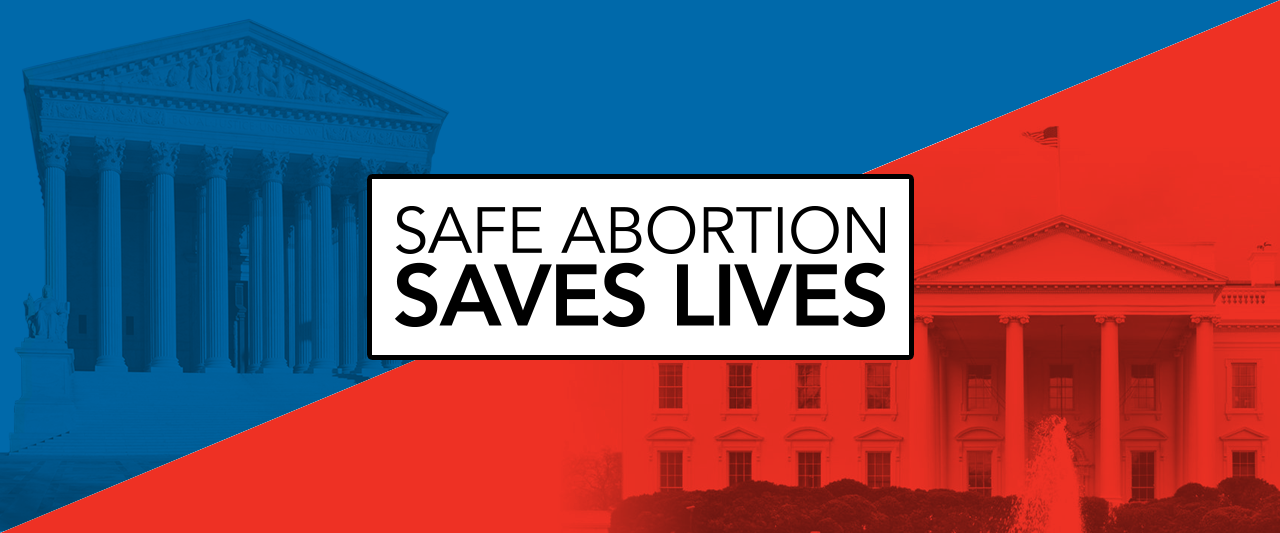Roe and the Global Gag Rule
Forty-six years ago, the Supreme Court decision in Roe v. Wade gave women in the U.S. the legal right to safe abortion—a landmark ruling now in danger of being overturned or severely weakened. This year also marks the second anniversary of the reinstated and expanded Global Gag Rule, a U.S. policy with far-reaching negative impacts on women’s access to abortion and contraception in developing countries around the world.
In this Q & A, we asked Ipas leaders and staff in India, Nigeria and the United States to reflect on some of the key issues at stake with Roe and the Global Gag Rule.
Roe v. Wade establishes abortion rights for U.S. women—but what about the issue of access?
Jina Dhillon, Associate Director, Ipas Access Team: Roe provides a vital federal framework for the respect and protection of the right to abortion. Without it, states would have a much easier path to undermining and blocking access to this vital health service.
But abortion rights in the United States are, and always have been, precarious, especially when it comes to meaningful access to services. Even with Roe in place, states are regularly attempting to roll back and/or place burdens on those seeking to exercise their right to safe, legal abortion care. And for vulnerable and marginalized populations, accessing abortion care has been made even more difficult. In 1976, for instance, the anti-abortion movement persuaded Congress to severely restrict the use of federal funds for abortion care for low-income women and adolescents in the Medicaid program. That provision still stands.
India is another country where abortion has been legal for decades, yet access to safe abortion services is a significant problem. Unsafe abortions still far outnumber legal procedures. What are the barriers preventing women in India from getting safe services?
Vinoj Manning, Executive Director of the India Development Foundation, which works in partnership with Ipas in India: The lack of trained providers is one of the biggest barriers. Most providers and health facilities are located in urban areas and not available for easy access. Women’s lack of knowledge about the legality of abortion is another challenge. Studies indicate that only about 20% of women in rural India are aware that abortion is legal. These kinds of barriers are further compounded by the fact that abortion is highly stigmatized.
How are IDF and Ipas working to break down these barriers?
IDF is working in 12 states in India to increase abortion access and availability of services. IDF collaborates with the government in providing abortion training and certification to about 800 new providers every year, who in turn go on to provide comprehensive abortion services to about 130,000 women annually. IDF also works with communities to establish outreach programmes to increase awareness about abortions among women and young girls.
Does India’s abortion law need to be amended to improve access to safe services?
Under the current abortion law, only about 3% of all potential health providers are permitted to offer abortion services. There is an urgent need to amend the law to permit other cadres of health-care workers and trained mid-level health providers to offer abortion services. IDF, along with other stakeholders, is advocating for this amendment to the law.
Looking at abortion rights beyond the United States, has the Global Gag Rule impacted advocacy work around sexual and reproductive health and rights, and if so, how?
Patty Skuster, Ipas Senior Legal Advisor: The United States is the largest government funder of reproductive health in the world, so our policies have an impact. With the Global Gag Rule, NGOs that had advocated for abortion access—a change in law or expanded services—were told by the U.S. government, you must stop your abortion advocacy work in order to receive US funds. We have seen where organizations have stepped away from an advocacy coalition, given this choice, because the United States is a major funder for many local groups with reproductive health expertise. The number of voices advocating for abortion rights is fewer, their voices quieter, which means that change to restrictive abortion laws may take longer or take more resources.
Nigeria has one of the highest ratios of maternal mortality in the world. How has the Global Gag Rule affected women’s ability to access sexual and reproductive health care there?
Hauwa Shekarau, Ipas Nigeria Country Director: With the reinstatement and expansion of the Global Gag Rule, the Trump administration is playing politics with the lives of women in Africa. Unsafe abortion is a major contributor to the maternal mortality ratio, and the gag rule means more women in Sub-Saharan Africa will die from unwanted pregnancies and unsafe abortion. It discriminates against people of color and people in the Global South. That’s what it is: discrimination.
What does the future look like for abortion rights around the world?
Patty Skuster: Over the past 20 years, we’ve seen a growth in advocacy for safe abortion access and change in national-level policy. Since 2001, over 30 countries have made their abortion laws more liberal. United Nations human rights bodies have clearly recognized the need for safe abortion in order to safeguard human rights and we are beginning to see calls for total decriminalization of abortion. In addition, we see the growth of community groups providing abortion pills and information and a decrease in deaths from unsafe abortion. In many contexts, it’s easier to get a safe abortion than ever before. Despite the rise of right-wing governments, we should expect this to continue.
For more information, contact [email protected]


